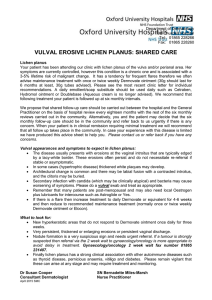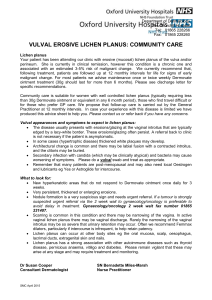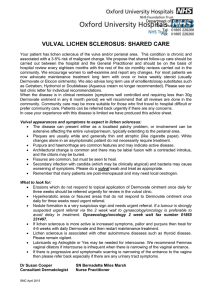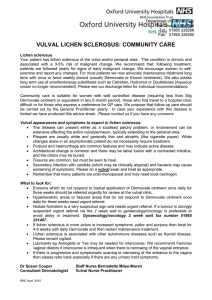Patient Information Sheet
advertisement
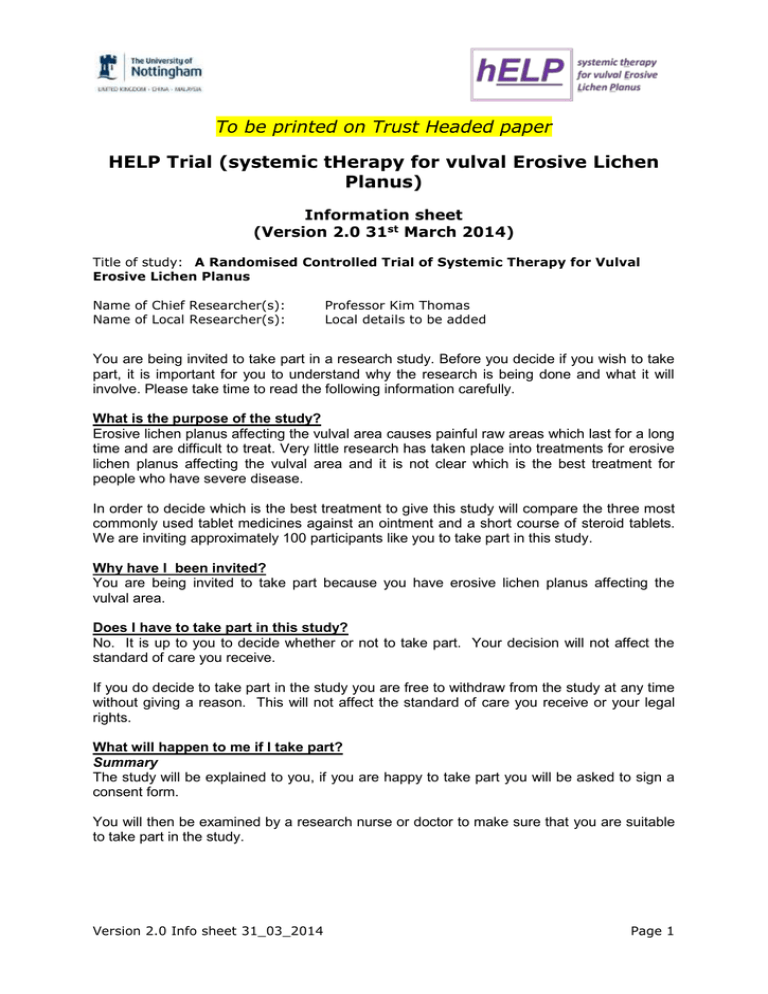
To be printed on Trust Headed paper HELP Trial (systemic tHerapy for vulval Erosive Lichen Planus) Information sheet (Version 2.0 31st March 2014) Title of study: A Randomised Controlled Trial of Systemic Therapy for Vulval Erosive Lichen Planus Name of Chief Researcher(s): Name of Local Researcher(s): Professor Kim Thomas Local details to be added You are being invited to take part in a research study. Before you decide if you wish to take part, it is important for you to understand why the research is being done and what it will involve. Please take time to read the following information carefully. What is the purpose of the study? Erosive lichen planus affecting the vulval area causes painful raw areas which last for a long time and are difficult to treat. Very little research has taken place into treatments for erosive lichen planus affecting the vulval area and it is not clear which is the best treatment for people who have severe disease. In order to decide which is the best treatment to give this study will compare the three most commonly used tablet medicines against an ointment and a short course of steroid tablets. We are inviting approximately 100 participants like you to take part in this study. Why have I been invited? You are being invited to take part because you have erosive lichen planus affecting the vulval area. Does I have to take part in this study? No. It is up to you to decide whether or not to take part. Your decision will not affect the standard of care you receive. If you do decide to take part in the study you are free to withdraw from the study at any time without giving a reason. This will not affect the standard of care you receive or your legal rights. What will happen to me if I take part? Summary The study will be explained to you, if you are happy to take part you will be asked to sign a consent form. You will then be examined by a research nurse or doctor to make sure that you are suitable to take part in the study. Version 2.0 Info sheet 31_03_2014 Page 1 The study will last for approximately 12 months, 6 months of treatment followed up by a questionnaire after a further 6 months. The visits will take place at your usual outpatient clinic and should not take more than ten minutes longer than your clinic usual appointments. In addition to the study visits, your hospital consultant will continue to see you as he/she normally would. It is important that you attend all booked visits as the treatments that you are given may need careful monitoring. Reasonable travelling expenses will be reimbursed. Design of the study The study is trying to find out which is the best treatment for erosive lichen planus of the vulva. In order to answer this question, the participants in the study will be split into 4 equal group groups. This will allow us to compare how well the lichen planus of the vulva is controlled in each of these four groups. To avoid any prejudice in the assessment of your condition, we cannot decide what treatment you will receive. This will be decided by chance by a computer, a bit like tossing a coin, and you will have an equal chance of being in any of the four groups. You will be told by your doctor which treatment you will be receiving, your doctor will give you a prescription for the medication you need. Study flow chart Up to 100 patients Clinic visit Medication specific safety assessments prior to start of treatment Prednisolone + clobetasol propionate 0.05% Hydroxychloroquine + clobetasol propionate 0.05% Methotrexate + clobetasol propionate 0.05% Mycophenolate mofetil + clobetasol propionate 0.05% Clinic visit (1 months) Clinic visit (3 months) Clinic visit (6 months) Final follow-up contact (12 months after starting treatment) Version 2.0 Info sheet 31_03_2014 Page 2 What medications are being used in the study? All patients who enter the study will be able to use a strong steroid ointment alongside their tablets. The ointment is currently the most common treatment given to treat erosive lichen planus affecting the vulva and is called clobetasol propionate 0.05%. You will additionally receive one of the four following medications: Hydroxychloroquine: This is a commonly used tablet that helps to ‘fine tune’ the body’s immune system. It is traditionally an anti-malarial medication but is used for many different skin conditions. It is taken once or twice daily. Methotrexate: This is a tablet that calms the body’s immune system. It is taken once weekly, but another tablet called folic acid is taken on the other six days to help prevent side effects. Mycophenolate mofetil: This tablet also calms the body’s immune system. It is taken twice daily. Prednisolone: This is a steroid tablet that calms the body’s immune system. In general it works quickly but is only used in short-term bursts to prevent side effects. It will be given for the first month alongside a strong steroid ointment after which the strong steroid ointment will be used by itself. Another course of prednisolone will not be given again during the 6 month study period. The tablets are the most commonly used tablets for the treatment of erosive lichen planus affecting the vulva, but they have never been properly assessed in a clinical trial because the condition is uncommon. This means that the drugs are not “licensed” for use in this condition, however, doctors still think that they could have beneficial effects. More information about the treatments is available to you in if you are interested in the study in the information sheets provided by the British Association of Dermatologists. Except for the steroid ointment, the treatments are all taken by mouth. The tablets are strong drugs and have known side-effects. Your doctor will talk to you about these and will explain the possible effects of each. You will be given a study specific information skin care booklet on how to care for the skin in the vulval area and will be prescribed a moisturiser to use. You should always tell any doctor treating you that you are taking these medicines because there are certain medicines that you cannot take at the same time as taking these. You should not take over-the-counter preparations without discussing this first with your doctor or pharmacist. You will be given further information about which drugs to avoid once you receive your medication. If the treatment that you have been given does not seem to be working, or you experience bad side-effects, then your hospital consultant may ask you to stop taking the study medication and try another treatment. If this happens your hospital consultant would still like to collect information towards the study and will continue to follow you up. What happens in the clinic? At your first visit, you will be examined by the research doctor/nurse and you will be asked some questions about your symptoms. You will also be asked to complete some short questionnaires. You will also be asked whether you have received any vaccinations within Version 2.0 Info sheet 31_03_2014 Page 3 the last two weeks. We will need to take a photograph of the area that is affected, this will be done by your research nurse or doctor or by the medical photography department of your hospital. Some of the medications you may take require us to check your blood samples as part of your routine care, if you are taking one of these medications we will need to take a blood sample during this visit. We will need the results of these blood samples before you start your tablets. Some of the medications you may take may require your doctor to do other tests as part of your routine care. Between your hospital appointments we may need to check your blood samples as part of your routine care, this may be done at your GP or at the hospital. At your 1 month clinic visit we will check whether you are taking your tablets correctly and see if we need to alter your dose. We may also need to take a blood sample and urine pregnancy test as part of your routine care. At your 3 month clinic visit we will check whether you are taking your tablets correctly and see if we need to alter your dose. We may also need to take a blood sample and urine pregnancy test as part of your routine care. We will also ask you about your symptoms and ask you to complete some short questionnaires. At your 6 month clinic visit you will be examined by the research doctor/nurse and you will be asked some questions about your symptoms. You will also be asked to complete some short questionnaires. We will also need to take another photograph of the area that is affected. Some of the medications you may take require us to check your blood samples as part of your routine care, if you are taking one of these medications for this medication we will need to take a blood sample during this visit. We may also need you to do a pregnancy test. During this visit you will be able to talk to your doctor about whether the medication is working and discuss your options for ongoing treatment You will not need to attend the clinic after 6 months, but we would like you to complete a short questionnaire at home after another 6 months, which will be the end of the study. The treatments that you will be receiving mean that your skin is more likely to be sensitive to sunlight. Therefore, you should limit your exposure to sunlight and ultra violet (UV) light by wearing protective clothing and using a sunscreen with a high protection factor. What are the alternative treatments? Because erosive lichen planus is such a rare condition, very little is known about the best treatments to use. The ones included in this study are the ones that are most commonly used, but the effects of these have never been properly studied in a randomised trial. What are the side effects of any treatment received when taking part? Erosive lichen planus can be a serious condition that needs strong medical treatment. All of the treatments in this study have been in use for many years for a wide range of medical and skin conditions. As a result their side-effects are well known. Clobetasol propionate 0.05% (Strong steroid ointment) When used correctly clobetasol propionate 0.05% rarely cause significant side effects. However, if it is used for excessive periods, it may cause changes to the treated skin. The most common side-effects of clobetasol propionate 0.05% are: Burning or stinging in the first few days of treatment Spread and worsening of untreated infection Version 2.0 Info sheet 31_03_2014 Page 4 Thinning of the skin which may be restored over a period after stopping treatment Stretch marks and prominent superficial blood vessels Less common side effects of clobetasol propionate 0.05% are: Loss of skin pigment (mild and reversible) Hair growth at the site of application Absorption through the skin to cause suppression of the adrenal glands Development of allergy to the ointment and subsequent worsening of the skin condition Prednisolone Side effects usually only occur from prednisolone if it is used long-term and with high doses. This study will use a low dose for a short period of time. The most common side-effects of prednisolone are: feeling sick, indigestion, stomach pain mood changes, feeling tired increased appetite / weight gain dizziness / difficulty sleeping thrush in the mouth a round face Less common side effects of prednisolone are: rise in blood pressure osteoporosis (brittle bones) more likely to develop infections diabetes Hydroxychloroquine Side effects with hydroxychloroquine are uncommon. The most common side-effects of hydroxychloroquine are: Rash Indigestion Diarrhoea Headache Less common side-effects of hydroxychloroquine are: Blurred vision Darkening of the skin Bleaching of the hair Mental changes Development of blood disorders Muscle problems Liver damage Sensitivity to sunlight Allergic reactions Heart problems Muscle problems Methotrexate The most common side-effects of methotrexate are: Nausea/vomiting Version 2.0 Info sheet 31_03_2014 Page 5 Tiredness Diarrhoea Abdominal pain Mouth ulcers Abnormalities of liver tests Development of blood disorders Less common side-effects of methotrexate are: Abnormalities of liver tests Abnormalities of kidney tests Development of blood disorders More likely to develop infections Rash Hair loss Scarring of the liver Scarring of the lungs Development of skin cancers Allergic reaction Mycophenolate mofetil Mycophenolate mofetil is generally well tolerated but can have side effects. The worst side effects are seen in people who are taking additional medications that also dampen the body’s immune system. The most common side-effects of mycophenolate mofetil are: Nausea/vomiting Tiredness Diarrhoea Abdominal pain Less common side-effects of mycophenolate mofetil are: Abnormalities of liver tests Abnormalities of kidney tests Development of blood disorders More likely to develop infections Rash Hair loss Diabetes Development of skin cancers Allergic reactions The side effects of all of these medications tend to get better if the dose is reduced. In order to adjust the dose of the drug to suit you, your doctor will conduct regular monitoring tests. Pregnancy and Contraception: If you are pregnant, trying to have a baby or are breastfeeding, you will not be able to enter this study. If you are of child-bearing age, then we will ask you to have a pregnancy test before taking part. You will be asked to use contraceptives throughout the treatment period and for six weeks after taking the last dose of your treatment. Version 2.0 Info sheet 31_03_2014 Page 6 You must agree to use a reliable form of contraception during the trial, e.g. oral contraceptive (the pill)and condom, intra-uterine device (IUD) and condom, diaphragm with spermicide and condom The hospital consultant may want to repeat the pregnancy test again during subsequent study visits. If you do get pregnant whilst you are involved in the study, you should tell your hospital consultant and GP straight away and you will be withdrawn from the study immediately. If you are receiving the drug called methotrexate you should agree to use a reliable form of contraception for 6 months after the treatment stops. Your doctor will advise if this applies to you. What are the possible disadvantages and risks of taking part? Because this study is comparing four commonly used treatments and the study is designed to mimic normal care, there are no additional risks or benefits to you personally in taking part in this study. The care that you will receive will be very similar to the care that you would receive if you were not taking part in the study. You will be closely monitored as part of your usual care. What are the possible benefits of taking part. There are no direct benefits to you because we cannot be sure that the medications will help you but the information we get from this study may help to guide doctors in how patients should be treated in the future. What happens when the research study stops? Because all of the study drugs are in everyday use, if you need to continue treatment after the study has ended, it will be available. Your normal care will continue after your involvement in the study has ended. We will inform all participants of the results of the trial after it has ended. What if there is a problem? If you have a concern about any aspect of this study, you should ask to speak to the local researchers (their contact details are at the end of this sheet) who will do their best to answer your questions. If any questions remain you can contact the Chief Investigator of this study Professor Kim Thomas (kim.thomas@nottingham.ac.uk). If you remain unhappy and wish to complain formally, you can do this by contacting NHS Complaints via the Patient Advisory and Liaison Service (PALS). The details are at the end of this leaflet. In the event that something does go wrong and you are harmed during the research study there are no special compensation arrangements. If you are harmed and this is due to someone’s negligence then you may have grounds for a legal action for compensation but you may have to pay your legal costs. The normal National Health Service complaints mechanisms will still be available to you. Will my taking part in this study be kept confidential? Yes. We will follow ethical and legal practice and all information about you will be handled in confidence. If you join the study, some parts of the data collected for the study will be looked at by authorised persons from the University of Nottingham who are organising the research. They may also be looked at by authorised people to check that the study is being carried out correctly. All will have a duty of confidentiality to you as a research participant and we will do our best to meet this duty. Version 2.0 Info sheet 31_03_2014 Page 7 All information which is collected about you during the course of the research will be kept strictly confidential, stored in a secure and locked office, and on a password protected database. Any information about you which leaves the research centre will have your name and address removed (anonymised) and a unique code will be used so that you cannot be recognised from it. All research data will be kept securely for seven years. After this time your data will be disposed of securely. During this time all precautions will be taken by all those involved to maintain your confidentiality. Only members of the research team will have access to their personal data. In order to be able to contact you about how you is getting on, your name and contact details will be made available to the researchers running this study. These details will be kept securely, with access restricted. You will not be named or otherwise identified in any study publication. We will also ask you if we can keep your contact details after the study finishes so that we can see if you are interested in any future research, we will only keep your details if you allow us to do so. You will be asked to consent to your identifiable details being registered with the NHS Information Centre. These may be used to help us keep in touch with you and to follow up your health status. We will have confidentiality and security agreements in place to ensure your details are dealt with in the strictest confidence. With your permission we will inform your GP that you are participating in this research study. We have a mailing list to inform patients about skin research that is being carried out. If you would like to be added to that list you can indicate this on the consent form. The contact email address you provide will be held in a separate secure database. What will happen if I don’t want to carry on with the study? Your participation is voluntary and you are free to withdraw at any time, without giving any reason, and without your legal rights being affected. If you withdraw then the information collected so far cannot be erased and this information may still be used in the project analysis. Will any genetic tests be done? There will be no genetics testing for this study. What if relevant new information becomes available about the topic being studied? Sometimes during the course of a research project new information becomes available about the topic being studied. If this happens, a member of the research team will tell you about it and discuss whether you want to continue in the study. If you decide that you wish to continue in the study you will be asked to sign an updated consent form. Also, on receiving new information the research team might consider it to be in your best interests to withdraw them from the study. If this happens, they will explain the reasons why. If the study is stopped for any other reason, you will be told why. What will happen to my blood samples? Any routine blood samples that are taken will be sent to your normal hospital laboratory for analysis. They will be treated in exactly the same way as if you were not in the study. What will happen to the results of the research study? Version 2.0 Info sheet 31_03_2014 Page 8 As erosive lichen planus in the vulval area is uncommon, we will be looking for patients in at least 10 hospitals, and the whole study will take two years to complete. When the study has been completed, the data will be analysed and the results published in a medical journal and presented at medical meetings. All data will be made anonymous before publication. You will be sent a copy of the results unless you tell us that you would prefer not to receive them. The results will allow a recommendation to be made to doctors about which treatment is best. Who is organising and funding the research? This research is being organised by the University of Nottingham and is being funded by the National Institute of Health Research (NIHR). Who has reviewed & approved the study? All research in the NHS is looked at by independent group of people, called a Research Ethics Committee, to protect your interests. This study has been reviewed and given favourable opinion by Yorkshire and The Humber Research Ethics Committee. Further information and contact details Contact Details of your local Research team Name__________________________ and Telephone Number______________________ If you have any general queries about participating in research you can contact the Patient Advisory and Liaison Service (PALS) Local PALS details to be added. THANK YOU FOR READING THIS INFORMATION SHEET Version 2.0 Info sheet 31_03_2014 Page 9
